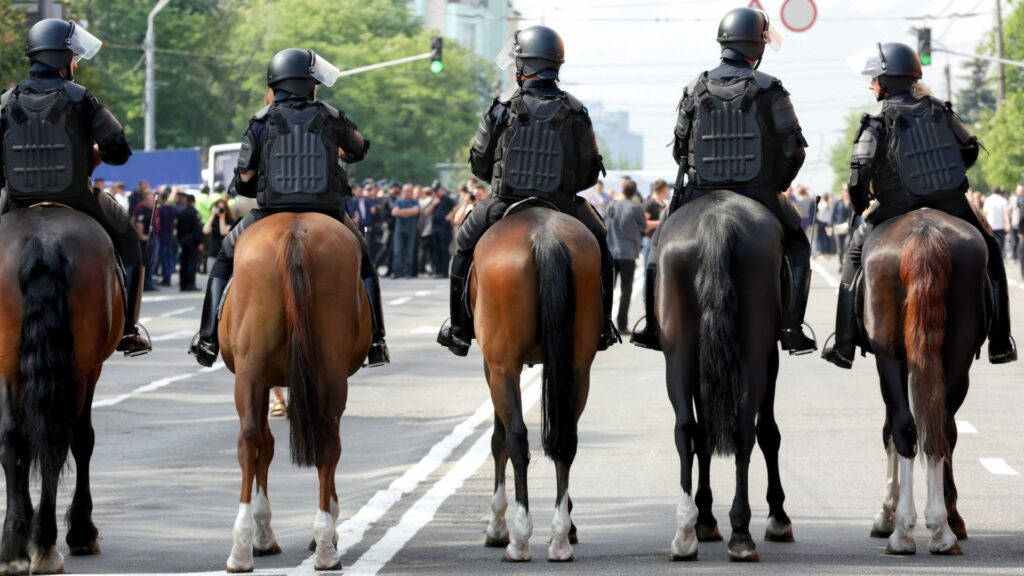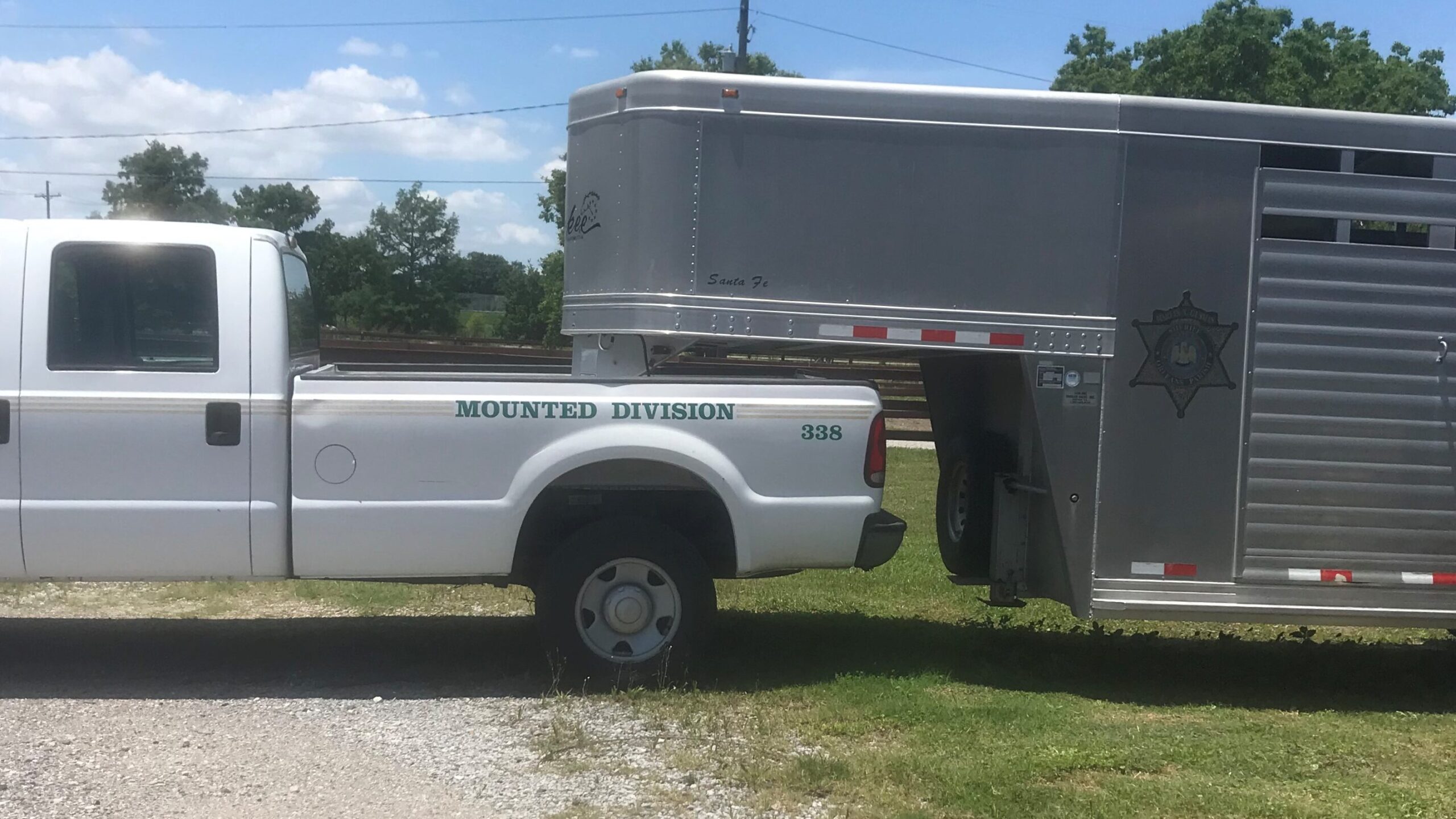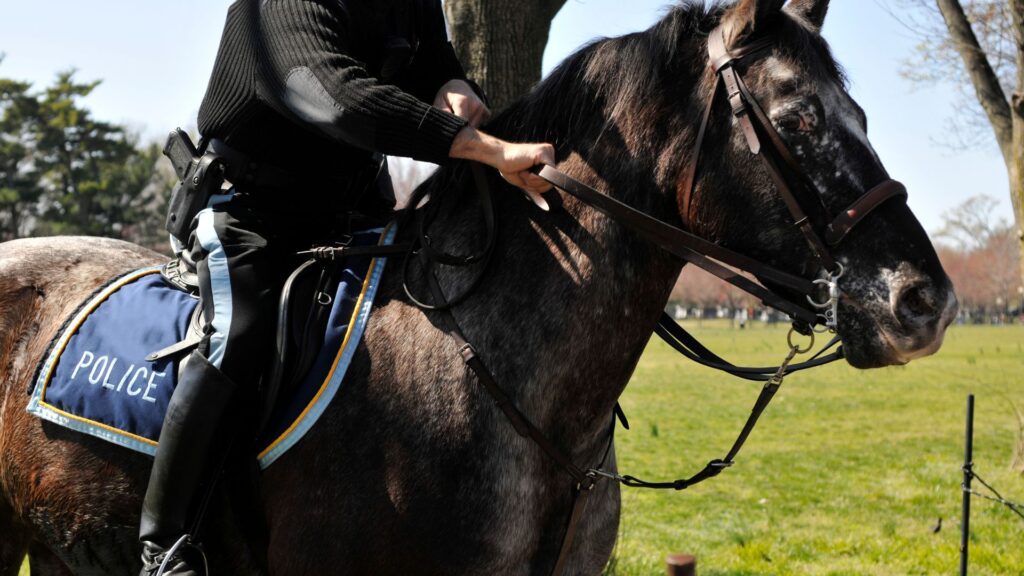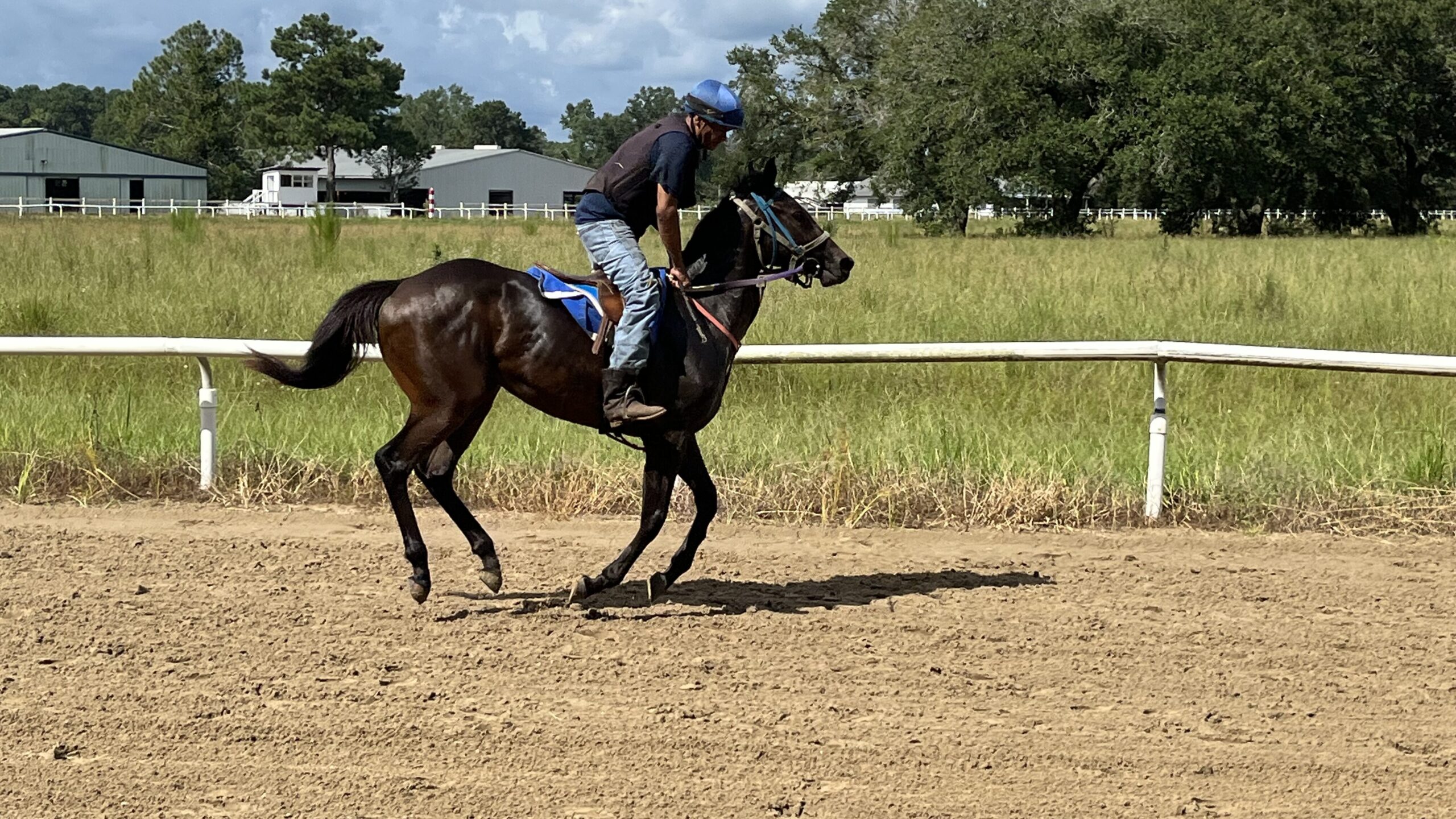Last updated: September 19, 2024
Imagine a bustling city street teeming with people and traffic. Amidst the chaos, a pair of mounted police officers emerge, their presence commanding attention and respect. The sight of imposing police horses working alongside their human partners evokes a sense of tradition and authority, a reminder that even in the 21st century, horses still play a vital role in law enforcement.
From crowd control to community engagement, mounted police units offer unique advantages that complement modern policing methods. Their elevated vantage point, maneuverability, and calming presence make them invaluable assets in various situations.
In this article, we will explore the history and evolution of mounted police, delve into the specific breeds and training involved, and examine the ongoing relevance of these equine officers in today’s world. So join us as we discover the fascinating world of horses at work in law enforcement.

Mounted Police Patrols: Horses at Work in Law Enforcement
Mounted police officers patrolling city streets or parks evoke a sense of tradition and authority. While their role may have evolved over time, mounted police units remain a valuable asset for law enforcement agencies worldwide. The earliest recorded mounted police unit dates back to 1758 in London.
Today, many major cities like New York and London still maintain active mounted divisions, as evidenced by the presence of the New York City Police Department Mounted Unit and the Metropolitan Police Mounted Branch. In fact, an estimated 1,000 mounted police units are operating in the United States alone, serving in various capacities, from crowd control to community policing.
The advantages of using horses for police work are numerous:
- Visibility and Accessibility:
- Horses provide officers with an elevated vantage point, enabling them to see over crowds and obstacles.
- Their ability to navigate narrow streets and alleys makes them ideal for patrolling areas inaccessible to vehicles.
- Crowd Control and Community Engagement:
- The imposing presence of a horse can be an effective tool for crowd control.
- Their gentle nature allows for positive interactions with the public, fostering community relations.
- The New York City Police Department recognizes these unique advantages, stating on its website that mounted patrols “provide a highly visible police presence, enhance community relations, and are particularly effective in crowd control situations.” Studies have shown that mounted police can be up to 20 times more efficient at dispersing crowds than officers on foot, demonstrating their effectiveness in maintaining public order.
- Search and Rescue:
- In certain terrains, horses can be more effective than vehicles or helicopters in search and rescue operations.
- Their sure-footedness and stamina allow them to access remote areas and navigate challenging landscapes, carrying riders and supplies to those in need.
- The National Park Service utilizes horses in various search and rescue operations, as detailed on their website. This highlights their ability to access remote wilderness areas and their effectiveness in locating lost or injured individuals.

Selecting the Right Horse: Criteria for Police Mounts
Not just any horse can become a police mount. These equine officers must possess unique physical and mental attributes to excel in their demanding roles.
- Temperament: A calm and steady disposition is essential. Police horses must remain composed and obedient even in chaotic or stressful situations, such as loud noises, crowds, or unexpected encounters.
- Physical Attributes: Soundness, stamina, and agility are crucial. Police horses often work long hours, covering significant distances on various terrains. They must also be able to maneuver quickly and efficiently in tight spaces.
- Trainability: Intelligence and a willingness to learn are essential. Police horses undergo extensive training to prepare them for their duties, and they must be able to respond promptly and accurately to their rider’s commands.
- Size and Presence: While not always a requirement, a larger stature can be advantageous for crowd control and visibility. However, the horse’s overall balance and athleticism are equally important.
Common breeds used for mounted police work include the Percheron, Clydesdale, and American Saddlebred, known for their combination of size, strength, and gentle temperament. However, other breeds, like Quarter Horses and Thoroughbreds, can also excel in this role, depending on their characteristics and training.

Forging the Partnership: Police Horse Training
Once a horse is selected for police work, it undergoes rigorous training to prepare it for the unique challenges of its new career. The training process typically lasts several months and involves:
- Desensitization: Horses are gradually exposed to stimuli they might encounter on patrol, such as loud noises, traffic, crowds, and obstacles. This helps them remain calm and focused in stressful situations.
- Obedience Training: Horses learn basic commands like walk, trot, canter, stop, and back up. They also learn to respond to more specialized cues like moving sideways or turning in tight circles.
- Crowd Control and Patrol Training: Horses are trained to navigate through crowds, stand calmly in busy areas, and respond appropriately to potential threats or disturbances.
- Obstacle Course Training: Horses are exposed to obstacles they might encounter on patrol, such as bridges, stairs, and uneven terrain. This helps them develop confidence and agility in navigating challenging environments.
- Bonding with the Rider: Building trust and respect between horse and rider is essential for successful police work. Officers spend countless hours training and interacting with their equine partners, fostering a deep connection that enables them to work effectively as a team.
The training process is ongoing, with horses receiving regular refresher courses and specialized training for specific events or situations. The trainers’ and officers’ dedication and expertise ensure that police horses are well-prepared to serve and protect their communities.

Why Police Horses Outshine Police Cars
In certain situations, police horses offer distinct advantages over their motorized counterparts. Their unique blend of mobility, visibility, and community engagement potential makes them invaluable assets for law enforcement.
- Unmatched Mobility: Horses can navigate tight spaces, crowded areas, and challenging terrain inaccessible to vehicles. This makes them ideal for patrolling parks, crowd control during events, and search and rescue operations in remote areas.
- Speed and Agility: While cars may be faster on open roads, horses can swiftly maneuver through obstacles and crowds, proving their worth in pursuits and emergencies. A study published in PLOS ONE found that mounted police can be up to 20 times more efficient at dispersing crowds than officers on foot, highlighting their effectiveness in maintaining public order.
- Visibility and Authority: The elevated position of an officer on horseback provides a commanding presence, enhancing visibility and deterring potential criminal activity. The horse, often a large and impressive animal, symbolizes authority and can help de-escalate tense situations.
- Community Engagement: Horses foster positive interactions with the public, building trust and goodwill between law enforcement and the community. Their gentle nature and approachability make them ideal for community outreach programs and events.
Living near New Orleans, I’ve witnessed firsthand the contribution of mounted police units, particularly during large events like Mardi Gras. Their ability to navigate crowded streets and maintain order is impressive. I’ve even had the opportunity to visit the New Orleans mounted police facility and observe their training firsthand. The bond between these officers and their equine partners is remarkable, built on trust, respect, and a shared commitment to serving the community.
- Environmental Friendliness: Compared to cars or motorcycles, horses offer a more sustainable and eco-friendly mode of transportation for patrolling, reducing carbon emissions and noise pollution.
While police cars remain essential for rapid response and transportation, horses continue to prove their worth in specific scenarios, showcasing their unique capabilities and the enduring partnership between humans and animals in serving and protecting our communities.
Below is a YouTube video of a day in the life of Mounted Patrol.
FAQs
What happens to police horses when they retire?
Retired police horses are typically given to the officer who rode them, a sanctuary, or an equestrian adoption service. Either way, former police horses typically enjoy a more relaxed lifestyle than they did while working.
Can I pet a police horse?
No, it would be best if you didn’t pet a police horse; they are on duty and are not pets. However, some departments have meet-and-greet periods and allow civilians to pet their horses.
What specific tasks do mounted police horses perform?
Mounted police horses assist in various tasks, including patrolling parks and urban areas, crowd control during events, search and rescue operations, and participating in community outreach programs.
How does the presence of police horses benefit communities?
Mounted police officers offer a unique blend of visibility, accessibility, and approachability. They can deter crime, de-escalate tense situations, and foster positive interactions with the public, building trust and goodwill between law enforcement and the community.
What are the challenges of maintaining a mounted police unit?
Maintaining a mounted police unit requires significant resources, including specialized training for both horses and officers, ongoing veterinary care, and suitable facilities for stabling and training the horses.

Conclusion: The Enduring Partnership of Horses and Law Enforcement
Mounted police units represent a unique blend of tradition and practicality in modern law enforcement. The advantages of horses—their visibility, accessibility, crowd control capabilities, and community engagement potential—make them invaluable assets in various situations.
However, the use of horses in law enforcement also comes with challenges. The need for specialized training, ongoing care, and ethical considerations requires dedication and commitment from both officers and the community.
If you’re interested in learning more about the work of mounted police, consider contacting your local police department or visiting their website. You can also support organizations like the Mounted Police Foundation, which promotes the use and ethical treatment of horses in law enforcement.
Horses continue to play various roles in our society, extending far beyond law enforcement. To explore the diverse ways horses contribute to our world, check out our comprehensive guide on working horses.
Let’s continue to appreciate and celebrate the unique partnership between horses and humans in serving and protecting our communities.

About the Author: Miles Henry
Lifelong Horseman | Racehorse Owner | Published Author
Miles Henry brings over 25 years of hands-on experience training and owning Thoroughbred racehorses. Raised with Quarter Horses and Appaloosas, he’s spent a lifetime learning from horses—on the track, in the barn, and in the field. Today, he runs a small but successful racing stable in Louisiana and shares real-world insights on HorseRacingSense.com, helping horse owners, fans, and bettors navigate the sport with confidence.
📚 Books: View Miles’s books on Amazon »
🎧 Podcast Guest: Animal Tales Ep. 32 |
YouTube Interview
📩 Newsletter: Sign up for racing tips and horse care advice »
🔗 Follow Miles:
Twitter |
Facebook |
YouTube


